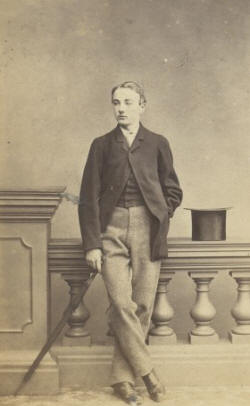

Queer Places:
42 Mount Street Upper, Saint Peter's, Dublin, Ireland
 Martin Oranmore Kirwan (April 26, 1847 - May 17, 1904)
was a captain in the Royal Irish Fusiliers involved in the so called Dublin
Castle scandal.
Martin Oranmore Kirwan (April 26, 1847 - May 17, 1904)
was a captain in the Royal Irish Fusiliers involved in the so called Dublin
Castle scandal.
Martin Oranmore Kirwan was the son of Richard Andrew Hyacinth Kirwan and Agnes Jane Thompson. He was a Captain of the Dublin Fusiliers. In 1884 he was involved in the trial of Gustavius Cornwall, Secretary of General Post Office, for conspiracy in connection with the Dublin scandals. Cornwall was accompanied by his Brother in law, Sir Robert Dalzell, and Capt Kirwan by his brother Capt J D Kirwan RA, his cousin Lord Oranmore, Col. Blundell, Col. Cox. The verdict was Not Guilty.
Tim Healy (Irish Nationalist MP) accused two high-ranking British establishment figures, of being homosexual in the United Irishman newspaper edited by William O’Brien MP. They were: James Ellis French, Detective Director of the Royal Irish Constabulary (RIC) and County Inspector for Cork, and Gustavus Charles Cornwall, Secretary of the General Post Office (GPO). Both men had little choice but to sue the newspaper to uphold their reputations. French backed off as there was multiple evidence of his sexual relationships with young police officers. He retired from the RIC on the grounds of being medically unfit. Cornwall denied all the allegations. The trial lasted five days but the jury took only an hour to find Cornwall guilty. He was charged with buggery and with conspiracy to corrupt young men.
Amongst those charged with conspiracy to commit indecent offences was Martin Oranmore Kirwan, a captain in the Royal Irish Fusiliers who was the son of a Galway landowner.[15][16] When Kirwan was a young lieutenant in the Dublin Militia, Jack Saul had been one of his sexual partners.[15] In 1884, Saul was interviewed by the police, and together with a John Daly who had also been frequently mentioned in the case, was brought from London to Ireland to be a Crown witness.[17] Saul was never called to give testimony – a matter which is still cause for speculation.[18] Saul later stated on the witness stand that he was told that it wasn't because of his disreputable character that his testimony wasn't used, but because his evidence was too old, relating to events of a considerable earlier date.[15] His record of interview was destroyed in the Irish Civil War.[19] Kirwan was acquitted on the grounds that the Crown did not produce sufficient evidence, but he resigned his commission.[20][21]
He died unmarried. Succeeded by his nephew, Denis Agar Richard Kirwan.
My published books: